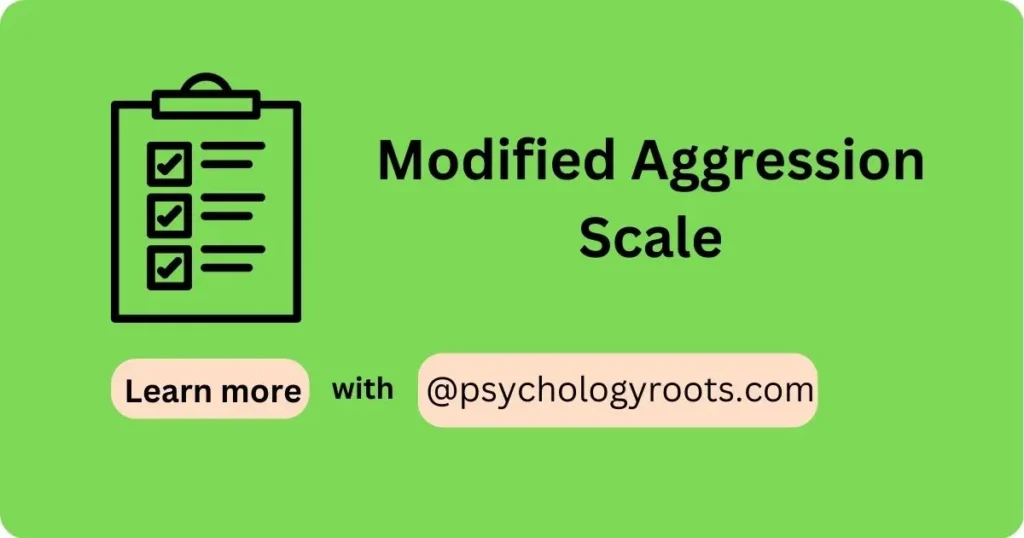Table of Contents
Modified Aggression Scale
Here in this post, we are sharing the “Modified Aggression Scale”. You can read psychometric and Author information. We have thousands of Scales and questionnaires in our collection (See Scales and Questionnaires). You can demand us any scale and questionnaires related to psychology through our community, and we will provide you with a short time. Keep visiting Psychology Roots.
About Scale Name
Scale Name
Modified Aggression Scale
Author Details
Phillip Orpinas
Translation Availability
Not Sure

Background/Description
The Modified Aggression Scale is a tool developed to measure aggressive behavior in middle school students. It consists of 22 items and four subscales: fighting, bullying, anger, and cooperative/caring behavior. The scale was developed by modifying the Aggression Scale, which was developed by Phillip Orpinas in 1993.
The Modified Aggression Scale was further developed by Kathleen Bosworth and Dorothy Espelage in 1995 to be used among urban youth. The scale has been found to have good internal consistency with each subscale having its own reliability coefficient. It is commonly used by researchers and practitioners to better understand aggressive behaviors among middle school students.
Scoring, Administration and Interpretation
The Modified Aggression Scale can be administered to middle school students in a group or individual format. The scale consists of 22 items that need to be answered on a four-point Likert scale, ranging from “never” to “always.” The questions are distributed across the four subscales: fighting, bullying, anger, and caring/cooperative behavior.
Scoring is done by adding up the responses for each subscale. Higher scores on the fighting, bullying, and anger subscales indicate higher levels of aggressive behavior, while higher scores on the caring/cooperative behavior subscale indicate lower levels of aggressive behavior.
Interpretation of the results should be done with caution as the scale is just one measure of aggression and cannot be used alone to diagnose a student’s aggressive behavior. It is important to consider other factors, such as context, frequency, and severity of the behavior. However, the Modified Aggression Scale can be a useful tool for identifying students who may be at risk for engaging in aggressive behaviors and developing intervention strategies to help them manage their behavior more effectively.
Reliability and Validity
The Modified Aggression Scale has been found to have good internal consistency, which is an indicator of reliability. Internal consistency refers to how well the items within each subscale of the scale measure the same construct. The reliability coefficients for each subscale are:
- Fighting: .73
- Bullying: .83
- Anger: .75
- Caring/cooperative behavior: .60
The Modified Aggression Scale has also demonstrated good validity, which is an indicator of whether the scale measures what it is intended to measure. Studies have shown that scores on the Modified Aggression Scale are positively correlated with other measures of aggression, such as teacher ratings and self-reports of aggressive behavior.
Additionally, the subscales have been found to be related to other relevant constructs, indicating that they are measuring different aspects of aggression. For example, the fighting subscale has been found to be related to physical aggression, while the bullying subscale has been found to be related to verbal aggression.
Available Versions
22-Items
Reference
Orpinas, P. (1993). The development of a questionnaire to measure aggression among middle school students: The Aggression Scale. Journal of Early Adolescence, 13(4), 436-461.
Bosworth, K., & Espelage, D. L. (1995). Examination of the Modified Aggression Scale among a sample of urban youth. Journal of Emotional Abuse, 1(4), 63-83.
Important Link
Scale File:
Frequently Asked Questions
What age group is the Modified Aggression Scale designed for?
The Modified Aggression Scale is designed for middle school students in grades 6-8.
Can the scale be used to diagnose aggressive behavior?
No, the scale should not be used as the sole basis of a diagnosis. It is just one tool among others that can help identify students who may be at risk for engaging in aggressive behaviors.
Can the scale be self-administered by the student?
Yes, the scale can be self-administered by the student or administered in a group or individual setting.
How long does it take to complete the scale?
The completion time for the scale can vary but typically takes around 10-15 minutes depending on the individual.
Are there any cultural biases in the scale?
The Modified Aggression Scale was developed and normed in the United States, so caution should be taken when using the scale with individuals from other cultures. Researchers and practitioners may need to adapt the scale to better suit their specific cultural context.
Disclaimer
Please note that Psychology Roots does not have the right to grant permission for the use of any psychological scales or assessments listed on its website. To use any scale or assessment, you must obtain permission directly from the author or translator of the tool. Psychology Roots provides information about various tools and their administration procedures, but it is your responsibility to obtain proper permissions before using any scale or assessment. If you need further information about an author’s contact details, please submit a query to the Psychology Roots team.
Help Us Improve This Article
Have you discovered an inaccuracy? We put out great effort to give accurate and scientifically trustworthy information to our readers. Please notify us if you discover any typographical or grammatical errors.
Make a comment. We acknowledge and appreciate your efforts.
If you have any scale or any material related to psychology kindly share it with us at psychologyroots@gmail.com. We help others on behalf of you.